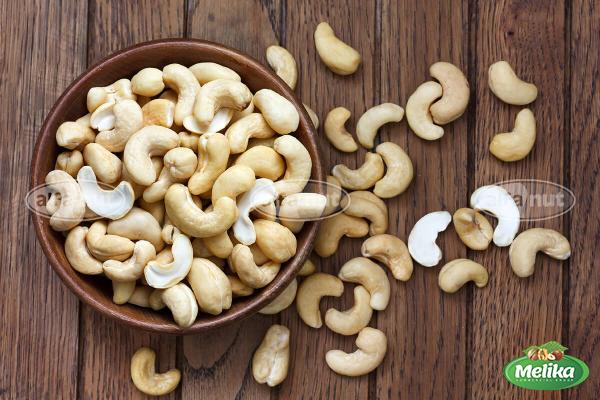Raw cashew nuts, also known as cashews or cashew kernels, are highly sought-after commodities in the culinary world due to their distinct flavor, nutritional benefits, and versatile culinary applications. These kidney-shaped nuts, native to Brazil, are treasured for their rich creamy texture, nutty taste, and excellent health properties. In this article, we delve into the wonders of raw cashew nuts, exploring their origin, nutritional composition, culinary uses, and the global cashew industry. Origin and Production: The cashew tree, scientifically known as Anacardium occidentale, is indigenous to Northeastern Brazil. Today, cashew trees are cultivated in several regions across the globe, including India, Vietnam, Nigeria, and Ivory Coast. The cashew fruit, which grows directly on the tree, consists of a cashew apple and a nut encased in a hard shell, known as the cashew nut kernel. The harvesting process involves separating the cashew apple from the nut, followed by a careful extraction of the raw cashew nut. Nutritional Composition: Raw cashew nuts are nutrient-dense powerhouses, providing a range of essential vitamins, minerals, and macronutrients. They are particularly notable for their high content of healthy monounsaturated fats, including oleic acid, which is associated with heart health. Additionally, cashew nuts are an excellent source of protein, dietary fiber, and important micronutrients such as copper, magnesium, and iron. The presence of antioxidants like vitamin E further enhances their nutritional value. Health Benefits: Consuming raw cashew nuts comes with numerous health benefits. The healthy fats found in cashews help reduce bad cholesterol levels, thereby promoting cardiovascular health. The high copper content aids in the production of collagen, supporting skin health and maintaining flexible joints and blood vessels. Moreover, the magnesium and iron in cashews are essential for energy production, nerve function, and bone health. These versatile nuts are also considered beneficial for weight management due to their satisfying nature and potential to regulate blood sugar levels.

nuts
 Culinary Uses: Raw cashew nuts can be enjoyed in various culinary delights due to their versatile nature and delicate flavor. They are commonly used in both sweet and savory dishes, making them ideal for desserts, spreads, sauces, curries, and even as a stand-alone snack. Cashew nuts can be ground into a fine powder to create creamy dairy alternatives, such as cashew milk or cashew-based cheeses. Their mild flavor and creamy texture also make them a popular ingredient in vegan and vegetarian recipes, providing a rich source of plant-based protein. Global Cashew Industry: The global cashew industry plays a significant role in both the agricultural and economic sectors of many countries. India, Vietnam, Nigeria, and Ivory Coast are among the largest cashew producers and exporters globally. These countries benefit from cashew production as it provides employment opportunities for many, particularly in rural areas. The cashew trade is a multi-billion-dollar industry, catering to worldwide demand for cashew nuts in various forms, including raw, roasted, and processed products. Risks and Precautions: Although raw cashew nuts are generally safe to consume, it is important to note that they contain a toxin called urushiol. This toxic compound is also present in poison ivy and poison oak, causing skin irritation and allergic reactions in some individuals. However, the levels of urushiol are significantly lower in the cashew nut kernel than in the shell. As a precaution, cashew nuts sold commercially are typically processed to remove any remaining urushiol. Those with known allergies to tree nuts should exercise caution and consult a healthcare professional before consuming cashews. Conclusion: Raw cashew nuts offer a plethora of culinary possibilities, health benefits, and economic opportunities for both producers and consumers around the world. From their origins in Brazil to being a staple ingredient in dishes globally, cashews have found their rightful place in the culinary world for their delicate flavor and nutritional value. Whether enjoyed as a crunchy snack or incorporated into delectable dishes, raw cashew nuts are a versatile and delicious addition to any diet. Market Demand and Global Consumption Trends The demand for raw cashew nuts has been steadily increasing worldwide in recent years. As consumers become more health-conscious and seek out nutritious and natural food options, raw cashew nuts have gained popularity. Additionally, the rise of vegan and vegetarian diets has further boosted the demand for cashew nuts as a versatile plant-based protein source. Global consumption trends indicate that the demand for raw cashew nuts is expected to continue growing, presenting business opportunities for cashew nut producers and retailers. Heading 2: Value Chain and Supply Chain The cashew nut value chain encompasses several stages, including cultivation, harvesting, processing, packaging, distribution, and retail. Cashew nuts typically undergo processing to remove the toxic urushiol, ensuring their safety for consumption. The supply chain for raw cashew nuts involves a network of growers, processors, exporters, and importers. Producers in cashew-producing countries play a vital role in supply chain management, ensuring that the nuts are of high quality and meeting international standards. Streamlining the supply chain process is crucial for businesses involved in cashew nut trading to ensure timely delivery of products and maintain quality standards.
Culinary Uses: Raw cashew nuts can be enjoyed in various culinary delights due to their versatile nature and delicate flavor. They are commonly used in both sweet and savory dishes, making them ideal for desserts, spreads, sauces, curries, and even as a stand-alone snack. Cashew nuts can be ground into a fine powder to create creamy dairy alternatives, such as cashew milk or cashew-based cheeses. Their mild flavor and creamy texture also make them a popular ingredient in vegan and vegetarian recipes, providing a rich source of plant-based protein. Global Cashew Industry: The global cashew industry plays a significant role in both the agricultural and economic sectors of many countries. India, Vietnam, Nigeria, and Ivory Coast are among the largest cashew producers and exporters globally. These countries benefit from cashew production as it provides employment opportunities for many, particularly in rural areas. The cashew trade is a multi-billion-dollar industry, catering to worldwide demand for cashew nuts in various forms, including raw, roasted, and processed products. Risks and Precautions: Although raw cashew nuts are generally safe to consume, it is important to note that they contain a toxin called urushiol. This toxic compound is also present in poison ivy and poison oak, causing skin irritation and allergic reactions in some individuals. However, the levels of urushiol are significantly lower in the cashew nut kernel than in the shell. As a precaution, cashew nuts sold commercially are typically processed to remove any remaining urushiol. Those with known allergies to tree nuts should exercise caution and consult a healthcare professional before consuming cashews. Conclusion: Raw cashew nuts offer a plethora of culinary possibilities, health benefits, and economic opportunities for both producers and consumers around the world. From their origins in Brazil to being a staple ingredient in dishes globally, cashews have found their rightful place in the culinary world for their delicate flavor and nutritional value. Whether enjoyed as a crunchy snack or incorporated into delectable dishes, raw cashew nuts are a versatile and delicious addition to any diet. Market Demand and Global Consumption Trends The demand for raw cashew nuts has been steadily increasing worldwide in recent years. As consumers become more health-conscious and seek out nutritious and natural food options, raw cashew nuts have gained popularity. Additionally, the rise of vegan and vegetarian diets has further boosted the demand for cashew nuts as a versatile plant-based protein source. Global consumption trends indicate that the demand for raw cashew nuts is expected to continue growing, presenting business opportunities for cashew nut producers and retailers. Heading 2: Value Chain and Supply Chain The cashew nut value chain encompasses several stages, including cultivation, harvesting, processing, packaging, distribution, and retail. Cashew nuts typically undergo processing to remove the toxic urushiol, ensuring their safety for consumption. The supply chain for raw cashew nuts involves a network of growers, processors, exporters, and importers. Producers in cashew-producing countries play a vital role in supply chain management, ensuring that the nuts are of high quality and meeting international standards. Streamlining the supply chain process is crucial for businesses involved in cashew nut trading to ensure timely delivery of products and maintain quality standards.
Specifications of nuts
 Export Markets and Opportunities Cashew nuts have a strong export market presence, with India and Vietnam being the leading exporters of processed cashew nuts. These countries have established large-scale processing facilities and have expertise in mechanized processing methods. As the demand for raw cashew nuts increases, opportunities arise for cashew-producing countries to explore the export market by focusing on both raw and processed products. Expanding into international markets requires adherence to quality control measures, compliance with food safety regulations, and maintaining competitive pricing. Heading 4: Value-Added Products and Processing Techniques Apart from the raw form, cashew nuts can be processed into various value-added products. Roasted cashew nuts, cashew butter, cashew milk, and cashew-based snacks are just a few examples of the diverse range of products that can be created from cashews. Processing techniques can include roasting, dry and wet grinders, blanching, and salting. Investment in processing infrastructure and innovative product development can help businesses diversify their offerings and cater to the growing demand for cashew-based products. Heading 5: Sustainability and Ethical Sourcing Sustainable and ethical practices in cashew nut production have become significant considerations for businesses in this industry. Adopting sustainable farming practices, such as utilizing organic fertilizers and minimizing water usage, can contribute to the long-term viability of cashew plantations. Furthermore, ethical sourcing practices, such as fair trade certifications and ensuring the well-being of workers in the supply chain, are gaining prominence. Businesses that prioritize sustainability and ethical sourcing can differentiate themselves in the market and appeal to consumers who prioritize these factors when making purchasing decisions. Heading 6: Packaging and Branding Strategies Packaging plays a crucial role in the presentation and marketing of raw cashew nuts. Eye-catching and informative packaging can enhance product visibility and attract consumers. With the rise of e-commerce, businesses need to consider packaging solutions that ensure product integrity during transportation. Innovative packaging designs, eco-friendly materials, and clear branding that highlights the product’s origin and quality can help businesses stand out in a competitive market. Heading 7: Market Challenges and Risk Management While the cashew nut industry presents lucrative business opportunities, there are also challenges to consider. Fluctuating commodity prices, changing weather patterns affecting cashew yields, and market volatility can impact profitability. Managing these risks requires businesses to implement effective risk management strategies, such as hedging against price fluctuations, diversifying sourcing options, and staying informed about market trends and geopolitical factors that might affect trade.
Export Markets and Opportunities Cashew nuts have a strong export market presence, with India and Vietnam being the leading exporters of processed cashew nuts. These countries have established large-scale processing facilities and have expertise in mechanized processing methods. As the demand for raw cashew nuts increases, opportunities arise for cashew-producing countries to explore the export market by focusing on both raw and processed products. Expanding into international markets requires adherence to quality control measures, compliance with food safety regulations, and maintaining competitive pricing. Heading 4: Value-Added Products and Processing Techniques Apart from the raw form, cashew nuts can be processed into various value-added products. Roasted cashew nuts, cashew butter, cashew milk, and cashew-based snacks are just a few examples of the diverse range of products that can be created from cashews. Processing techniques can include roasting, dry and wet grinders, blanching, and salting. Investment in processing infrastructure and innovative product development can help businesses diversify their offerings and cater to the growing demand for cashew-based products. Heading 5: Sustainability and Ethical Sourcing Sustainable and ethical practices in cashew nut production have become significant considerations for businesses in this industry. Adopting sustainable farming practices, such as utilizing organic fertilizers and minimizing water usage, can contribute to the long-term viability of cashew plantations. Furthermore, ethical sourcing practices, such as fair trade certifications and ensuring the well-being of workers in the supply chain, are gaining prominence. Businesses that prioritize sustainability and ethical sourcing can differentiate themselves in the market and appeal to consumers who prioritize these factors when making purchasing decisions. Heading 6: Packaging and Branding Strategies Packaging plays a crucial role in the presentation and marketing of raw cashew nuts. Eye-catching and informative packaging can enhance product visibility and attract consumers. With the rise of e-commerce, businesses need to consider packaging solutions that ensure product integrity during transportation. Innovative packaging designs, eco-friendly materials, and clear branding that highlights the product’s origin and quality can help businesses stand out in a competitive market. Heading 7: Market Challenges and Risk Management While the cashew nut industry presents lucrative business opportunities, there are also challenges to consider. Fluctuating commodity prices, changing weather patterns affecting cashew yields, and market volatility can impact profitability. Managing these risks requires businesses to implement effective risk management strategies, such as hedging against price fluctuations, diversifying sourcing options, and staying informed about market trends and geopolitical factors that might affect trade.
buy nuts
 Research and Development for Cashew Cultivation Investing in research and development for cashew cultivation is essential for the long-term sustainability of the industry. Developing disease-resistant cashew varieties, optimizing cultivation techniques, and improving post-harvest processing methods are areas that require ongoing research. Collaboration between government bodies, research institutes, and industry stakeholders can drive innovation and improve productivity, resulting in higher-quality cashew nuts and increased competitiveness in the global market. Heading 9: B2B and B2C Marketing Strategies Businesses involved in raw cashew nut trading can employ specific marketing strategies to target both business-to-business (B2B) and business-to-consumer (B2C) segments. B2B marketing strategies involve building strong relationships with retailers, processors, and distributors through trade shows, industry events, and personalized communication. B2C marketing aims at creating brand awareness among consumers through online and offline channels, highlighting the nutritional benefits, culinary uses, and unique features of raw cashew nuts. Heading 10: Regulatory Compliance and Quality Control Maintaining regulatory compliance and adhering to quality control standards are vital for businesses operating in the cashew nut industry. Compliance with international food safety regulations, such as relevant certifications (e.g., ISO, HACCP, FDA), ensures that cashew nuts meet the required quality and safety standards. Implementing strict quality control measures, including regular testing and batch inspections, helps build trust with consumers and enhances the reputation of the business. Heading 11: Investment Opportunities and Future Prospects The global demand for raw cashew nuts opens up investment opportunities for entrepreneurs and investors. Areas such as cashew nut processing facilities, research and development, sustainable farming practices, packaging innovation, and market expansion offer potential for growth and profitability. With increasing awareness of the nutritional benefits and versatile culinary uses of cashews, the future prospects for the cashew nut industry remain promising. Conclusion: The raw cashew nut industry presents a multitude of business opportunities, driven by increasing global demand for nutritious, versatile, and plant-based food products. From cultivation to processing, packaging, and distribution, businesses in the cashew nut trade must navigate the challenges of maintaining quality standards, complying with regulations, and managing market volatility. However, with strategic marketing, sustainable practices, and innovative approaches, businesses can thrive in this dynamic industry. The continued popularity of raw cashew nuts, along with the potential for value-added product development and increased demand, ensures a prosperous future for this culinary delight.
Research and Development for Cashew Cultivation Investing in research and development for cashew cultivation is essential for the long-term sustainability of the industry. Developing disease-resistant cashew varieties, optimizing cultivation techniques, and improving post-harvest processing methods are areas that require ongoing research. Collaboration between government bodies, research institutes, and industry stakeholders can drive innovation and improve productivity, resulting in higher-quality cashew nuts and increased competitiveness in the global market. Heading 9: B2B and B2C Marketing Strategies Businesses involved in raw cashew nut trading can employ specific marketing strategies to target both business-to-business (B2B) and business-to-consumer (B2C) segments. B2B marketing strategies involve building strong relationships with retailers, processors, and distributors through trade shows, industry events, and personalized communication. B2C marketing aims at creating brand awareness among consumers through online and offline channels, highlighting the nutritional benefits, culinary uses, and unique features of raw cashew nuts. Heading 10: Regulatory Compliance and Quality Control Maintaining regulatory compliance and adhering to quality control standards are vital for businesses operating in the cashew nut industry. Compliance with international food safety regulations, such as relevant certifications (e.g., ISO, HACCP, FDA), ensures that cashew nuts meet the required quality and safety standards. Implementing strict quality control measures, including regular testing and batch inspections, helps build trust with consumers and enhances the reputation of the business. Heading 11: Investment Opportunities and Future Prospects The global demand for raw cashew nuts opens up investment opportunities for entrepreneurs and investors. Areas such as cashew nut processing facilities, research and development, sustainable farming practices, packaging innovation, and market expansion offer potential for growth and profitability. With increasing awareness of the nutritional benefits and versatile culinary uses of cashews, the future prospects for the cashew nut industry remain promising. Conclusion: The raw cashew nut industry presents a multitude of business opportunities, driven by increasing global demand for nutritious, versatile, and plant-based food products. From cultivation to processing, packaging, and distribution, businesses in the cashew nut trade must navigate the challenges of maintaining quality standards, complying with regulations, and managing market volatility. However, with strategic marketing, sustainable practices, and innovative approaches, businesses can thrive in this dynamic industry. The continued popularity of raw cashew nuts, along with the potential for value-added product development and increased demand, ensures a prosperous future for this culinary delight.











Your comment submitted.